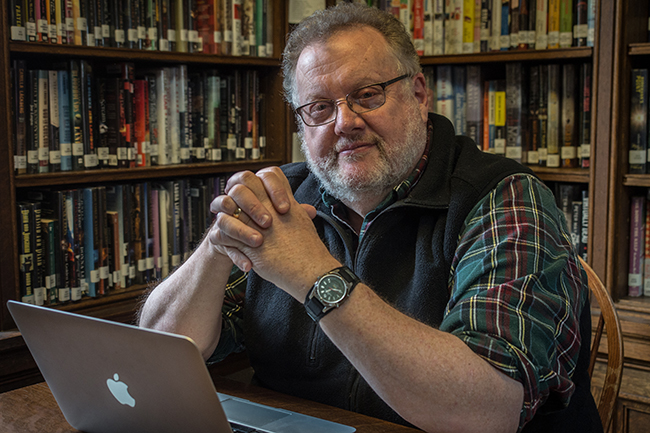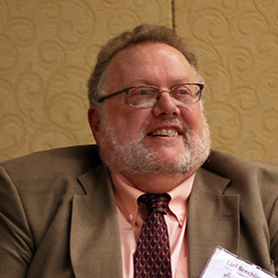By Kehinde Sokan, Bulletin Staff
‘The board of directors of the bank are business owners throughout the community. So, not only did the bank pull its advertising because of our stories, but so did other businesses in solidarity, including our largest advertiser.’
— Earl Brechlin, Former editor
Bar Harbor (Maine) News, Current editor
Mt. Desert Islander, Bar Harbor


It was midafternoon on a spring day in 1994 when Earl Brechlin, then editor of the Bar Harbor (Maine) Times, was told by the newspaper’s receptionist that there was a call on the telephone for him from a man who wouldn’t leave his name.
Brechlin took the call, recognizing the voice as that of an employee of the First National Bank of Bar Harbor. The man asked to meet Brechlin that evening, requesting to come through a back door so as not to be seen by anyone on the street. Brechlin agreed. He left the lights off in the front office, and when the man arrived, led him to his secluded office in the back of the building.
During that meeting, Brechlin was informed that the bank was being reviewed by the federal Office of the Comptroller of the Currency, the Federal Home Loan Mortgage Corporation, and Federal National Mortgage Association.
The bank’s troubles began in 1992, “but matters such as these are kept quiet,” Brechlin said.
Brechlin, who left the Times in in 2001 to be editor of then-new Mount Desert Island of Bar Harbor, jumped on the story immediately.
Through sources, he was able to obtain documents from federal investigators.
The documents “detailed all the deficiencies they had found with the bank,” Brechlin said. “They had people on the board of directors who had loans without paperwork, and credit cards that weren’t being paid off. Most of the problems entailed people who worked at the bank or officers of the bank who were refinancing their mortgages and were obtaining federal loans through falsified documents.”
“There were concerns that appraisals were being artificially inflated to justify larger mortgages,” Brechlin said.
Before running his first story on the scandal, Brechlin ran it by the Bar Harbor Times’ lawyers to make sure that the paper would not be in any legal jeopardy, and then by the newspaper’s publisher.

‘Over the years in a small town I’ve had my storage shed torched, tires slashed, windows smashed and cameras stolen.’
— Earl Brechlin
“He knew there would be a fallout from covering the story, but told us to run it anyway,” Brechlin said.
After the story was published that detailed the alleged violations and the allegations against the bank, Brechlin was paid a visit at his office by an FBI agent. He was asked where Brechlin had obtained his information, but Brechlin refused to tell the agent. Brechlin had promised his sources that he would not reveal their identities and, fortunately, he didn’t have to.
“I guess they had plenty else to do, because they never bothered us again,” Brechlin said.
A couple of months into covering the story, with concerns about a conflict of interest and for his personal safety, Brechlin closed his multiple accounts with the bank.
“My checking account, my savings account, my mortgage were in that bank. So, while I’m writing about this, they can see my whole life,” Brechlin said. “So, I actually moved my accounts. I took about a 3 percent hit to my mortgage because I redid it at another bank with a higher rate just so I didn’t have any involvement with them.”
Brechlin covered the story for a year and a half, and he was greeted with anger from the bank’s executives.
“There was plenty of intimidation that there would be hell to pay (for) this stuff,” Brechlin said.
Members of the bank’s board of directors called the newspaper and complained about the stories.
“I wasn’t privy to the conversations, but I’m sure they had something to do with financial impact if we continued to pursue the story,” he said.
The Bar Harbor Times did take a substantial financial hit bringing the story to readers.
“The board of directors of the bank are business owners throughout the community. So, not only did the bank pull its advertising because of our stories, but so did other businesses in solidarity, including our largest advertiser (Shop & Save, which had a full-page ad in the Times),” Brechlin said.
Competing banks pulled their advertising too.
“It wasn’t to punish us, but they didn’t want to look like they were kicking a guy while he’s down,” Brechlin said.
The Bar Harbor Times saw a 10 to 15 percent revenue decrease for a couple of months, but fortunately the paper could afford it at the time, Brechlin said.
Brechlin was also treated with hostility by some members of the community.
“I didn’t receive any direct threats. Certainly I could walk in the grocery store and feel the darts in my back sometimes,” Brechlin said.
“There were different points in the story where I looked both ways before crossing the street,” Brechlin said with a chuckle.
Brechlin said being targeted for his work wasn’t new to him.
“Over the years in a small town I’ve had my storage shed torched, tires slashed, windows smashed and cameras stolen,” Brechlin said.
Although there were members of the community who were closely associated with those implicated in the investigations who were upset with Brechlin’s reporting of it, there were also people in the community who were grateful and appreciated the lengths to which he went to cover the story, Brechlin said.
When it came time for the trials of those charged as a result of the investigation, other reporters at the paper took over.
According to a 1996 story by the Bangor (Maine) Daily News, the bank, in a settlement with the federal government, had to pay a $1-million fine and the bank’s president of seven years, Frank G. Bean III, had to resign. Nearly all of the bank’s board members, many of whom individually paid $1,000 fines, also had to resign. Some past employees of the bank also had to pay $1,000 fines. One bank employee, a loan processor, went to jail, Brechlin said.
Brechlin doesn’t regret the role he played in exposing the bank’s misconduct.
“For me, the ethical ramifications of it was that the people that ran that bank made decisions about the health of the bank, about the ethics of the bank, and they were investing their money, but the public didn’t know that information. It wasn’t fair that only the insiders at the bank knew whether or not it was smart to bank there or that they only got the sweetheart deals,” Brechlin said. “ … I think it was a learning experience for everybody … There hasn’t been something like this since.
“What happened is people at the bank were making financial decisions with that information in mind, but the public was denied that information, so if you were trying to decide, ‘What bank should I put my savings account in, or my checking account in? Where should I get a mortgage from?’ then you might want to know whether the place is being run right or not,” Brechlin said.
Bailey Knecht, an undergraduate student in the Northeastern University School of Journalism, contributed to this report.
